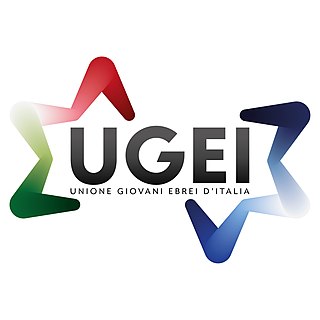Judeo-Italian is an endangered Jewish language, with only about 200 speakers in Italy and 250 total speakers today. The language is one of the Italian dialects. Some words have Italian prefixes and suffixes added to Hebrew words as well as Aramaic roots.

Fiamma Nirenstein is an Italian-Israeli journalist, author and politician. In 2008 she was elected to the Italian Parliament for Silvio Berlusconi's The People of Freedom party and she served as Vice President of the Committee on Foreign Affairs of the Chamber of Deputies for the length of the legislature, ending in March 2013. On 26 May 2013 she went to Israel. In 2015, Nirenstein was nominated by Israeli Prime Minister Benjamin Netanyahu as the future ambassador to Italy, but subsequently withdrew for what she stated were personal reasons. She is Senior Fellow of Jerusalem Center for Public Affairs (JCPA) and currently works there, at the Israeli-based think-tank of JPCA. She is moreover a leading columnist for the Italian daily Il Giornale and contributes articles in English to the Jewish News Syndicate. She is also on the Board of ISGAP and of the WJC.

Tadeusz Pieronek was a Polish Roman Catholic auxiliary bishop-emeritus, Catholic academic and professor of theology and civil law. Pieronek was a leading member of the Stefan Batory Foundation.
David Castelli was an Italian scholar and educator in the field of secular Jewish studies. He was educated at the rabbinical college of Leghorn, and from 1857 to 1863 was teacher of Hebrew and Italian in the Jewish schools of that city. Then he became secretary of the Jewish congregation in Pisa, where at the same time he was a private teacher. From January 1876 until his death he occupied the chair of Hebrew at the Istituto di Studi Superiori Pratici e di Perfezionamento in Florence.
Amos Luzzatto was an Italian-Jewish writer and essayist, born in a family of ancient tradition. His mother's father, Dante Lattes, was one of the most important representatives of Jewish Italian culture in the 20th century. His father's great-great-grandfather, Samuel David Luzzatto (Shadal), was teaching at the Rabbinical College in Padua and was an Italian representative of the "Wissenschaft des Judentums".

Raffaele Cantoni (1896–1971) was an anti-fascist Italian Jew who is best known for his efforts, perhaps daring, in saving Italian Jews from the Holocaust.
The filmography on immigration in Italy is a phenomenon started with the arrival of the first migratory flows in Italy, since the 1990s.
DeepCon is an Italian science fiction, fantasy and horror fan convention, covering multiple entertainment forms and media, mixed with a dose of actual, real-world science.
Nino Valeri was an Italian historian.
Nicoletta Maraschio is an academic teacher of "History of Italian Language" at University of Florence. She was the first woman in charge of Accademia della Crusca, from 2008 to 2014, succeeding Francesco Sabatini.

The Naturalized athletes of Italy are those naturalized citizens who are part, or have been part, of the Italy national athletics team.
Angelo Paggi, born Mordecai Paggi, was an Italian Jewish Hebraist, philologist and educator.

The Unione Giovani Ebrei d'Italia (UGEI) is an Italian organization for young Jewish people. It is the youth branch of the Union of Italian Jewish Communities, the umbrella organization for Jewish communities and organizations in the country. It represents all Italian Jews between 18 and 35 years old, as well as all local Jewish youth organizations.

Maurice M. Roumani, born in Benghazi, Libya, is Professor of Politics and International Relations, Religion and Society of the Middle East and the Founder of the J. R. Elyachar Center for Studies in Sephardi Heritage at Ben-Gurion University of the Negev in Israel. He specializes in Ethnic Relations in Israel, Jews of Arab countries, the Middle East Conflict, and he is an expert on the History of Libyan Jews, Jewish-Muslim Relations and the impact of Holocaust policies in North Africa.
Giovanni Garbini was an Italian Orientalist and Semitist. His biblical studies revealed historical omissions and helped scholars to interpret the biblical narrative in the larger context of the history of the ancient Near East. He worked as a university lecturer in the Istituto Universitario Orientale in Naples, at the Scuola Normale in Pisa and finally in Sapienza in Rome until his retirement. He was a member of the Lincean Academy since 1990, and a member of the Leone Caetani foundation for Islamic studies.
Moses Vita Ascarelli, also known by the pen name Emet le-Ya'akov, was an Italian physician, rabbi, writer, poet, and translator.
Simonetta Bernardi was an Italian historian and academic. She taught at the Sapienza University of Rome and at Roma Tre University.
Samuel Vita della Volta, also known by the acronyms שמ״ח and שח״ם, was an Italian physician and Hebraist, who flourished in Mantua. He wrote a number of commentaries, sermons, and responsa, which remain in manuscript.
Pietro Perreau was an Italian librarian and Hebraist.





